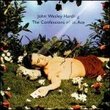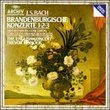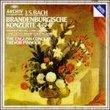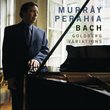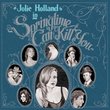| All Artists: Hans Hotter, Gerald Moore Title: Great Recordings Of The Century - Schubert: Winterreise / Hotter, Moore Members Wishing: 0 Total Copies: 0 Label: EMI Classics Release Date: 5/4/1999 Genres: Pop, Classical Styles: Vocal Pop, Opera & Classical Vocal, Historical Periods, Modern, 20th, & 21st Century Number of Discs: 1 SwapaCD Credits: 1 UPC: 724356700024 |
Search - Hans Hotter, Gerald Moore :: Great Recordings Of The Century - Schubert: Winterreise / Hotter, Moore
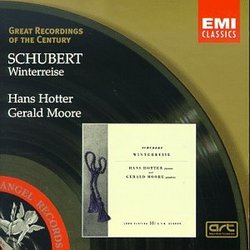 | Hans Hotter, Gerald Moore Great Recordings Of The Century - Schubert: Winterreise / Hotter, Moore Genres: Pop, Classical
|
Larger Image |
CD DetailsSimilarly Requested CDs
|
CD ReviewsThe greatest performer of Winterreise lampros | 08/02/2000 (5 out of 5 stars) "Winterreise is probably the peak of Schubert's production of lieds. Based on Müller's cycle of poems, Winterreise is an inner journey through solitude and death. Where will the wanderer be able to rest? He seems doomed and even death will not accept him in one of the lieder. Schubert wrote this music for Johann Michael Vogl, a liric baritone, but the cicle has been song for many kinds of voice: tenors like Patzak and Pears, basses like Talvela and the unforgetable Greindl ( the blakest of all), the great soprano Lotte Lehmann or the famous baritone Fischer Dieskau, for many the best performer of this music. At least for my taste Dieskau is impressive but overnuanced ( just like Anders ' perfomarce is overdramatical). The first time i heard this cd, about a year ago, i was blown up. What a voice! What an extraordinary spiritual unity! Hotter takes a very interesting point of view when he performs the wanderer. He is not the wanderer who suffer but a third who feels compassion for him. Like God who feels compassion of the sinner. And you can feel this compassion everywhere on this cd. For me, Hotter, Dieskau, Pears, Greindl and Patzak are the references in Winterreise" Phenomenal is the word Rosomax | Boulder, CO United States | 09/18/2003 (5 out of 5 stars) "While most of us have gotten used to hear Die Winterreise performed by lyric baritones such as Dietrich Fischer-Dieskau or more recently Thomas Hampson, the reading of bass Hans Hotter will undoubtedly send chills down your spine. What leaves a lasting impression is how much Hotter cares for the music. His bass voice was one of the darker ones, but he lightens it considerably on many selections, unless required by Schubert to convey defiance. Interestingly, perhaps due to a fact that bass voices are often associated with priests, it does appear as he is relating a narrative (as monk Pimen in Boris Godunov). There's no pain in his rendition, just sadness where appropriate. Fischer-Dieskau with his tenorial sound and Wunderlich a true lyric tenor, as well as several famous sopranos, have chosen to depict the suffering of a poet as he wanders through gloomy landscape. Hotter's voice is so consoling and calming, that any person who had suffered a broken heart would actually feel its healing power. Hotter's diction is impeccable, every word is crisp and clear, none of the vowels are covered. Gerald Moore, the undisputed king of lieder accompaniment has great rapport with the singer. They consistently support each other, as though having a night time dialogue in an abandoned church. He allows Hotter plenty of time to make a point and responds ably on faster more fiery selections. There's nothing but praise that could be said about this CD. A must for any lieder fan." One of the greatest song cycles ever written sung by one its Craig Matteson | Ann Arbor, MI | 11/09/2005 (5 out of 5 stars) ""Winterreise" (Winter Journey) uses the texts of twenty-four poems by Wilhelm Müller, a minor German poet who is fortunate to be remembered for Schubert's setting of these poems and those of "Die schöne Müllerin". Schubert discovered the poems at different times and composed the first twelve in early 1827 and the second twelve later in that year. The order of the songs is not the order that Müller gave them, nor did Schubert reorder them after the set was finished. However, there has been a debate ever since about performance order and some singers do sing them in the poet's order rather than Schubert's deeming the composer's rather arbitrary. However, sung by a voice of the quality of Hans Hotter, the printed order is very effective and sounds wonderfully well.
Adding to the confusion in trying to arrive at a definitive version are the changes and corrections Schubert made while preparing a final copy for the printer. His original submission was illegible and was leading to many mistakes, so he had to redo the score and in the process made changes. These alternate versions are noted in the thematic catalog and require the singer to make a choice. Do you want to sing what Schubert and Vogl sang before the songs were printer or the composers final version? And are you sure of either choice being what you really think it is? Composing these songs was especially important to Schubert. He arrived very late to a party his friends were throwing for him much to their surprise and consternation. One of his friends thought the composing of these songs took so much from Schubert that the effort led to his early death in 1829. This is not true, because these last few years were remarkably productive and included works of great energy, but it gives you a sense how seriously these songs were taken by those who new the composer. Schubert's art during his last years was not all darkness and ice, regardless of how compelling and complete that aesthetic is in these songs. The cycle opens with these words of the poem "Goodnight" (in translation): A stranger I arrived here, A stranger I go hence. Maytime was good to me With many a bunch of flowers. The girl spoke of love Her mother even of marriage. Now the world is dismal, The path veiled in snow. From the first that his friends heard Schubert sing the first twelve songs, they liked "The Lime-tree": By the well at the town gate / there stands a lime tree;/ in its shadow I have dreamed / full many a sweet dream. On its bark I have carved / full many a loving word. / IN joy and sorrow it drew / me to it again and again. Just now my journey took me / past it at the dead of night, / and even in the darkness / I had to close my eyes. And its branches rustled / as if they were calling to me: / "Comer here to me, lad, / here you will find your rest"! The chill winds blew / straight in my face: / my hat flew off my head. / I did not turn back. Now I am many hours / distant from that place; / yet still I hear the rustling: / "There you would have found rest". To perform these songs without break would take about seventy-five minutes, in a recital with a short intermission it is about an hour and a half. To pull this off dramatically requires a very able singer who can communicate with his audience very intimately. He also has to find a way to vary the telling enough to keep the mood from being unrelieved bleakness. Hans Hotter was born in 1909 and died just recently, in 2003. He had a long and remarkable career and was especially associated with the role of Wagner's Wotan. He first sang that role in Munich in 1937 and was associated with the Wagner shrine, Bayreuth 1952 - 64. This is important because Schubert is usually associated with lyric, not Wagnerian, Baritones. Yet Hotter, an historically great Wagnerian, was also known for his solo recitals and Schubert's "Winterreise" was one of his specialties. This wonderful recording is him singing this work in his prime. There is a special timbre to his voice that remains expressive no matter how quietly he sings and keeps its rich darkness. His range of expression in these works is amazingly broad and deep. There is an immediacy that draws you into feeling as if you were the poet and these were your words and your music. This is a great recording and you owe it to yourself to get to know it. As always in Schubert, the pianist is as important as the singer because Schubert put so much of the poetic expression in the piano. For example, his friends commented on the unique way Schubert expressed the moving branches talked about in "The Lime-tree". Gerald Moore is a fabulous pianist who supports Hotter perfectly. As in all great Schubert performances, the singer and pianist are partners making a single piece of music rather than a soloist - accompanist. Get and enjoy this disk and you will be in even greater awe of Schubert and grateful to these artists for sharing him with you." |

 Track Listings (24) - Disc #1
Track Listings (24) - Disc #1